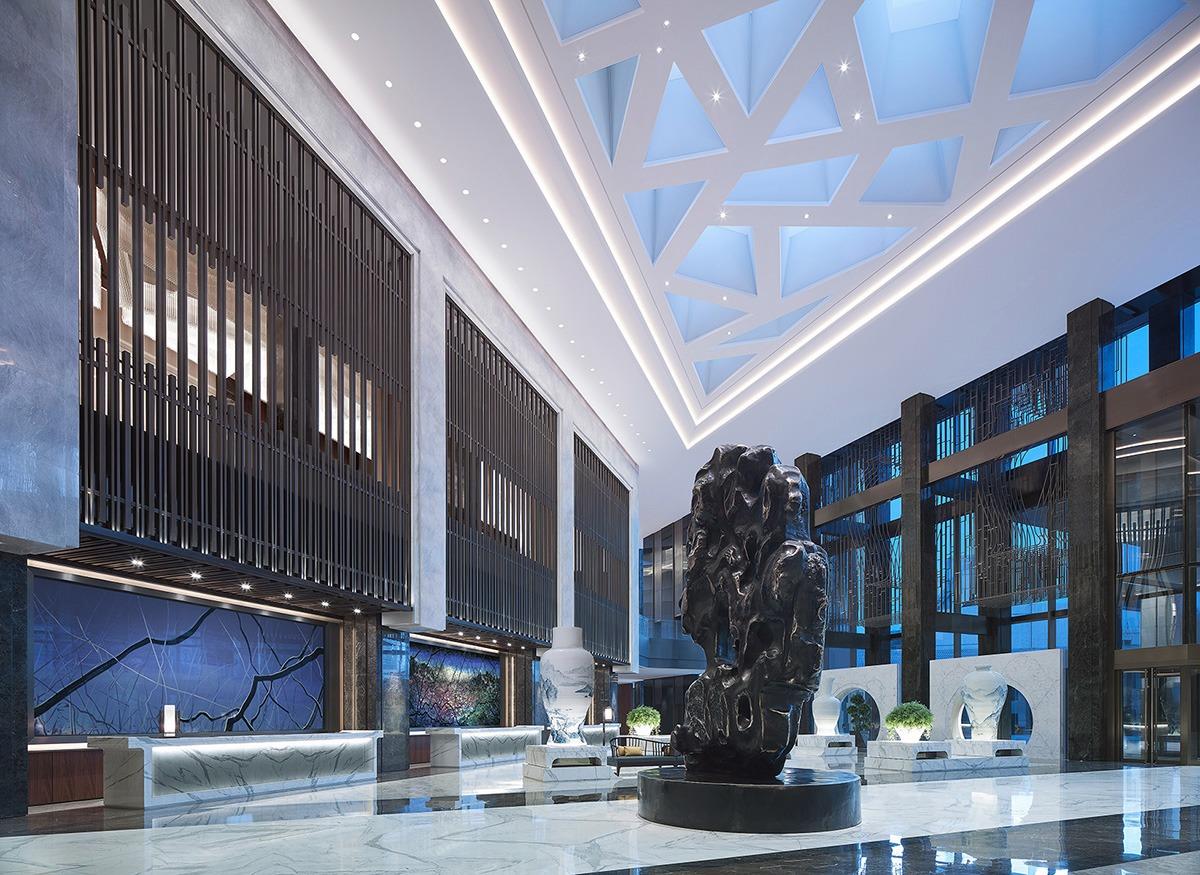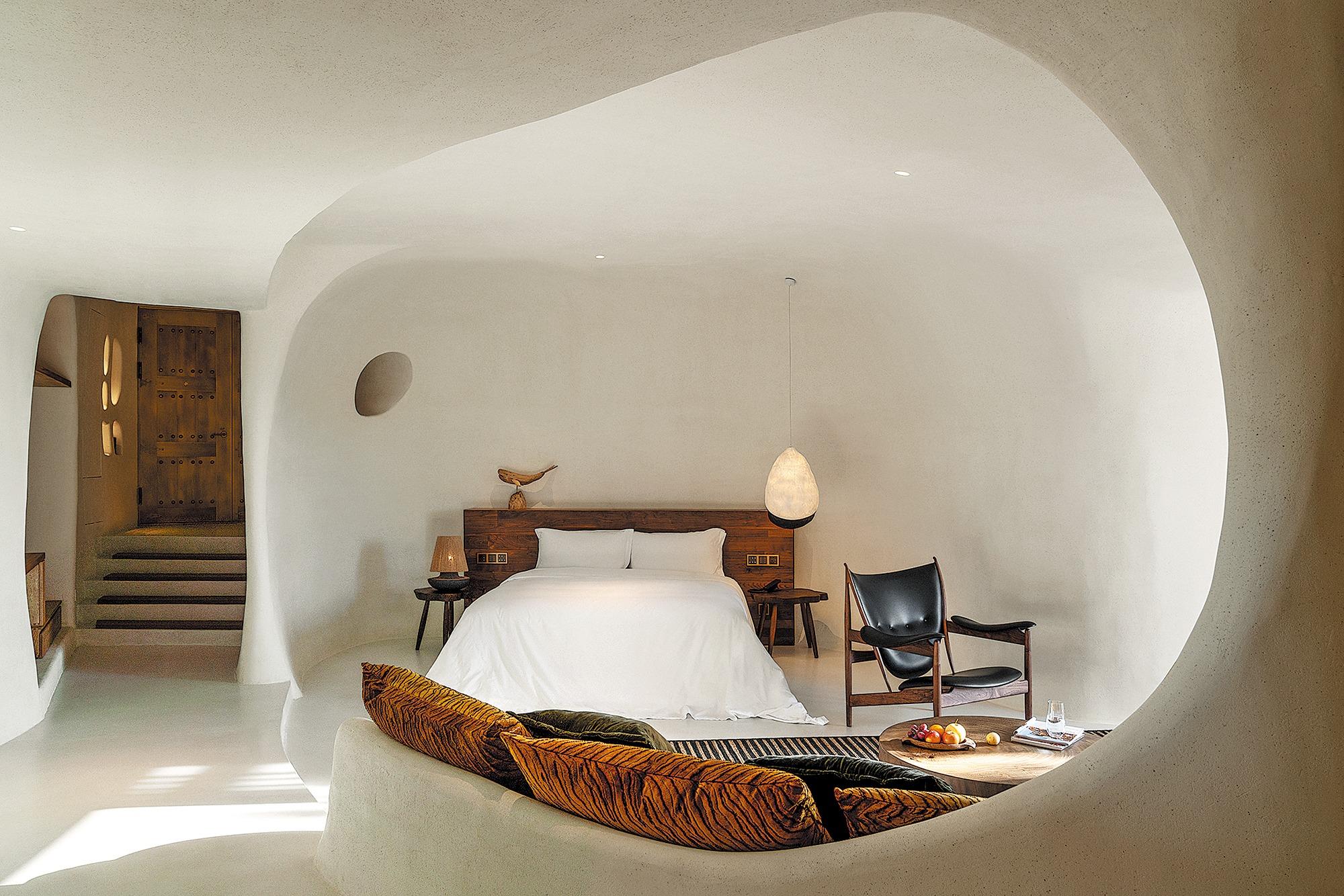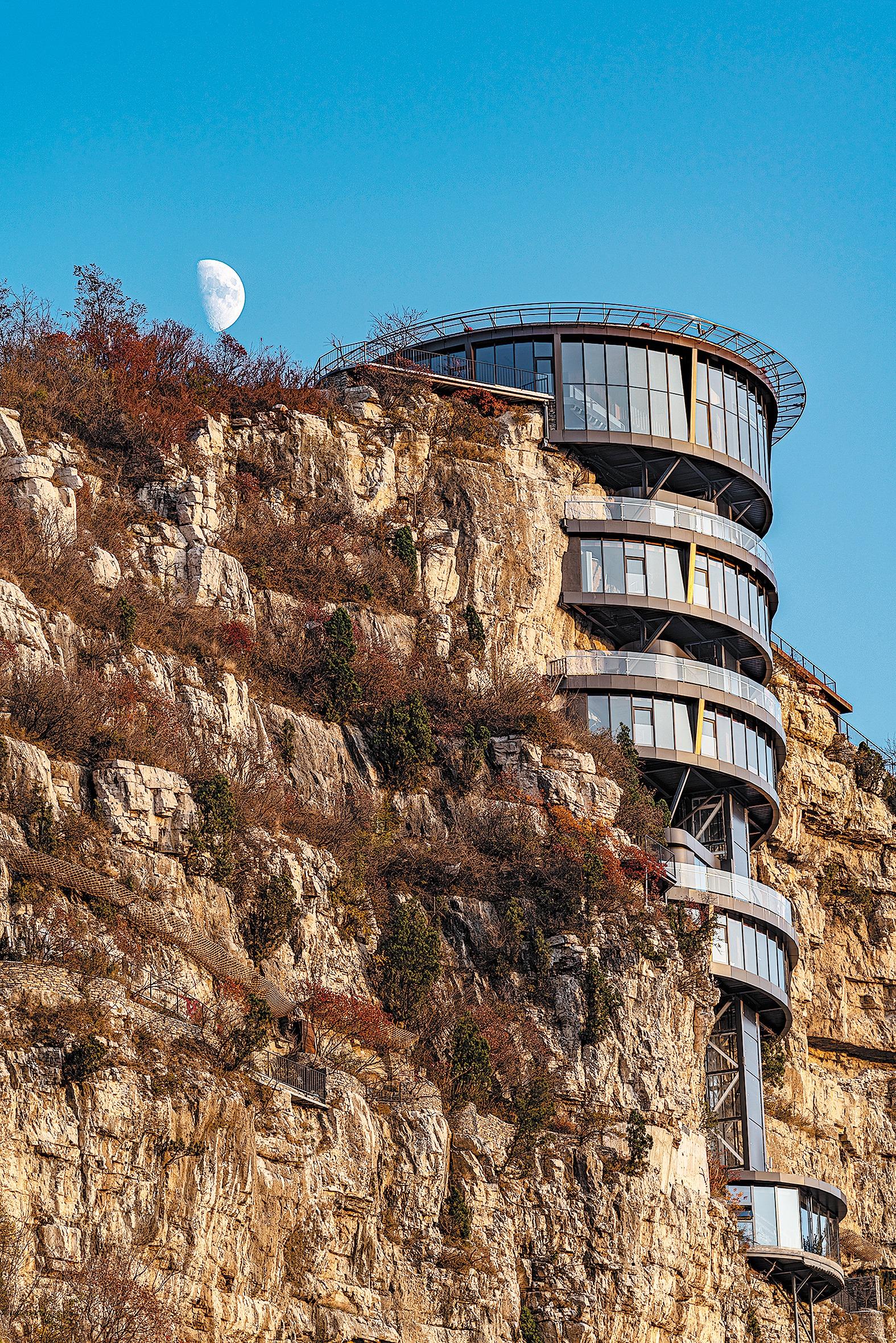Hotel ambiance enhanced by the fragrance of alluring smells, Li Yingxue reports.
 Nuo Hotel in Beijing extended a special invitation to world-renowned master perfumer, Christophe Laudamiel, to create their brand-named fragrance. (PHOTO PROVIDED TO CHINA DAILY)
Nuo Hotel in Beijing extended a special invitation to world-renowned master perfumer, Christophe Laudamiel, to create their brand-named fragrance. (PHOTO PROVIDED TO CHINA DAILY)
When Li Xiaojuan, her husband, and their 7-year-old son stepped into the lobby of the Bright Qi Hotels and Resort, perched precariously on an 800-meter-high cliff, an enchanting scene unfolded.
As the glass door swung open, a delicate fragrance greeted them. The natural aroma was reminiscent of the freshly mown grass they had strolled past moments before entering, yet was imbued with a distinct, unforgettable quality.
"Every facet of this hotel is in harmony, from the fragrance to the lighting, all integrating with the outdoor ambiance," Li said. "The scent gives you a first impression of the hotel, before you even enter your room."
They had chosen to spend a night there to celebrate her son's summer vacation in August, and now, as she reminisces about their experience, that captivating fragrance still lingers vividly in her memory.
When one envisions luxury hotels, one may conjure up images of opulent decor, impeccable service, and breathtaking views. However, there's an enchanting dimension to these havens of hospitality that often escapes the spotlight — their unique and tantalizing fragrance.
These are not just pleasant aromas; they are the invisible threads that weave the fabric of luxury, adding an intangible layer of indulgence to every stay.
With the increasing demands of Chinese consumers for a higher quality of life, the use of fragrances in hotels has gained significant popularity. In 2022, the Chinese hotel fragrance industry experienced an impressive 20 percent year-on-year growth in market size according to gonyn.com, an industry consulting website.
 A cave room at the Bright Qi Hotels and Resort in Zibo, Shandong province. (PHOTO PROVIDED TO CHINA DAILY)
A cave room at the Bright Qi Hotels and Resort in Zibo, Shandong province. (PHOTO PROVIDED TO CHINA DAILY)
An increasing number of hotels are embracing the concept of tailor-made fragrances, with scents featuring distinct Chinese elements like tea, wood, herbal, floral, and culinary notes, emerging as the latest trend.
The fragrance that lingers vividly in Li's memory is called "the cold pines in the forest".
The scent boasts top notes of green leaves, aquatic undertones, and bergamot. In its heart, it reveals the harmonious blend of Siberian fir, Himalayan cedar, and delicate orange blossom. As a final flourish, its base notes enchant with the rich interplay of Oakmoss, rockrose, French cypress, and the subtle allure of musk.
According to Hu Huiling, general manager of Bright Qi Hotels and Resort, this fragrance has been specially formulated for the hotel by their team after multiple adjustments.
The hotel, located in the Tanxi Mountain Geological Park in Zibo, Shandong, opened in November and is one of the province's first so-called "wild luxury" adventure and vacation lifestyle brands.
Resembling a moon set in the mountain peaks, the entire space is built clinging to cliffs, with a circular semi-enclosed architectural facade suspended on the surface of the sheer face.
"We aim for travelers to remember a city through our hotel. We view our hotel as a cultural vessel, offering more than just accommodation; it's a way of life and a bridge that connects visitors to the surroundings," Hu explains.
 The farm, the outlook, and the sunset view from the Bright Qi Hotels and Resort in Shandong. (PHOTO PROVIDED TO CHINA DAILY)
The farm, the outlook, and the sunset view from the Bright Qi Hotels and Resort in Shandong. (PHOTO PROVIDED TO CHINA DAILY)
The hotel, she adds, was in preparation for three years before opening. "During the design, our primary goal was to engage all five senses of our guests, and fragrance played a pivotal role," Hu explains.
They collaborated with a third-party team to craft the fragrance, and it took them two months to perfect the final formula.
When tourists encounter this scent, they may find themselves transported to a forest or canyon, where the fragrance of rocks and wood permeates the air, she says.
"Our aim is to use fragrance to encourage them to explore the wilderness and foster a deeper connection with nature," she expresses.
This fragrance undergoes subtle shifts with the daily interplay of sunlight and changes according to humidity levels, resulting in nuanced variations that are perceived differently by each individual and its overall essence is profoundly soothing, Hu adds.
Hu has been working in the hotel industry for more than a decade, and has noticed that over the years customers have been raising their expectations for every detail, including fragrance.
The realm of hotel fragrances stands as a testament to the meticulous attention to detail and unwavering commitment to guest satisfaction that luxury hotels hold in high regard. These fragrances are far more than just pleasant odors; they constitute an integral facet of the overall sensory journey that renders a stay at these establishments truly exceptional.
 The farm, the outlook, and the sunset view from the Bright Qi Hotels and Resort in Shandong. (PHOTO PROVIDED TO CHINA DAILY)
The farm, the outlook, and the sunset view from the Bright Qi Hotels and Resort in Shandong. (PHOTO PROVIDED TO CHINA DAILY)
For example, Nuo Hotel in Beijing extended a special invitation to Christophe Laudamiel, a world-renowned master perfumer, to craft an exclusive fragrance under the hotel's brand-name. This distinctive aroma serves as a testament to the hotel's embodiment of Chinese elegance and its deep-rooted appreciation of tea culture.
A white-tea-themed fragrance emerges as a multifaceted scent, yet it encapsulates simplicity within its elegance and elevation. It evokes a touch of purity reminiscent of martial arts from the Shaolin Temple in Henan province, the essence and spirituality of Buddhism, and the exclusivity of white tea.
Meanwhile, upon entering the lobby of The Ritz-Carlton Tianjin, one is instantaneously immersed in the captivating essence of black orchid. This alluring fragrance, crafted by Antica Farmacista, a renowned luxury home fragrance brand based in Seattle, blends fresh floral notes with the warmth of benzoin, infused with the spicy allure of Baltic amber and patchouli.
Diverging from the common practice of placing aroma diffusers in hotel lobbies, this hotel has integrated its aroma diffuser system in the central air conditioning intake. This approach ensures that the fragrant liquid permeates the entire lobby through the air conditioning ducts, subsequently diffusing into various areas via the fresh air outlets.
The captivating fragrance is continuously diffused 24 hours a day, ensuring that regardless of the time you step into the lobby, you will always be greeted by the evocative scent.
For those wishing to carry this aromatic experience beyond their hotel stay, The Ritz-Carlton sells a black orchid reed diffuser, along with a selection of other classic fragrance products, through its online shops. This way, guests can bring their preferred scent into their own homes, ensuring the memory lingers long after their stay.
 The farm, the outlook, and the sunset view from the Bright Qi Hotels and Resort in Shandong. (PHOTO PROVIDED TO CHINA DAILY)
The farm, the outlook, and the sunset view from the Bright Qi Hotels and Resort in Shandong. (PHOTO PROVIDED TO CHINA DAILY)
The power of scent in triggering memories is well-documented. Hotel fragrances are not limited to just making spaces smell pleasant; they aim to create an emotional connection.
According to Lu Haiqun, deputy general manager of operations for the high-star hotel division at Wanda Hotels and Resorts, they have crafted distinct fragrances for each of their sub-brands, aligning them with the brand's individual character and decor. For example, one bamboo-themed scent is a harmonious fusion of ginger flower and the refreshing, gentle aroma of green bamboo.
"The Wanda Scent Program not only aims to cultivate an aromatic and delightful ambiance but also to establish an additional distinctive olfactory signature," Lu says.
By captivating guests through these scents, the program aims to elicit emotion and forge enduring memories. It plays a pivotal role in fostering guest identification, bolstering loyalty to the hotel, and deepening comprehension of the brand's essence, he adds.
The selected areas for fragrance infusion include the hotel lobby and elevator waiting halls.
"Pure natural essential oils are atomized into fine, mist-like particles via specialized diffusion devices," Lu explains. "This process achieves a seamless integration of the essential oil's fragrance with the surrounding environment."
The concentration of the fragrance has also been carefully calculated, taking into consideration the hotel's design as well as factors such as wind direction and flow velocity to ensure the optimal concentration, he says.
Contact the writer at liyingxue@chinadaily.com.cn


